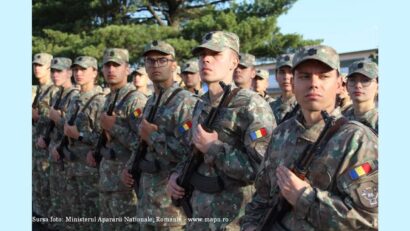Working with young people in Romania
The profession of youth worker has only been regulated in Romania since 2012, when it was included on the official list of occupations.

Luana Pleşea, 08.08.2018, 13:26
Lets begin with the words of Mihai Dragos, the head of the Romania Youth Council:
“We need youth workers to help young people in communities fulfil their potential, integrate into society, interact with other young people and get to know themselves better. I have noticed that young people often find it difficult to understand very well what they can do within societies, which are the institutions and NGOs that can assist them so that they can do meaningful things for themselves and fulfil their potential.”
Few people have heard about youth workers, a profession that was only regulated in Romania in 2012, when it was included into the official list of occupations in this country. Marius Dontu, an expert in the field and a manager at Schultz Consulting Romania, the company behind the initiative to have this occupation recognised officially, was part of the team that drew up the occupational standards for this new profession. He says this was a necessary step because in his opinion “too many people were working with young people and anyone working with young people thought they were experts in the field.” Marius Dontu:
“At first we came up with a very long list of competencies for this profession. Then we decided not to make the youth worker a superhero and pick only four specific competencies. The first one is the ability to inform young people, which means informing them on various activities, advantages and rights that they have, and opportunities like international exchange projects or opportunities that might help their careers. The second one is projecting the standard for personal and professional development, which means talking to them and helping them find their own personal and professional path. Another competence is supporting the process of non-formal learning among young people, which involves activities that should teach them how to take decisions by themselves, solve problems, have initiatives, get involved and be active. The fourth competence is developing cooperation within the community, which means that youth workers, based on the problems that they identify inside the groups of young people, propose types of services or interventions at community level.”
Youth workers can be employed by NGOs carrying out activities for the young people. One such NGO is Curba de Cultura Association, set up in the village of Izvoarele, in Prahova county, which only addresses young people in rural areas. Among the associations employees there are two youth workers. When it comes to the main difficulties they encounter in terms of legal framework, Cosmin Catana, the associations president, prefers thinking of them as opportunities:
“We have the opportunity to include the youth worker profession in the youth law. There is a new bill that defines the concepts of youth activity, youth worker and youth centres. The current youth law, for example, does not provide a definition for the concept of youth centre. We have the opportunity to take these things further and bring more clarity in this area in Romania, thus moving closer to the standards in other European states where there is a long-standing tradition in the area of youth work.”
Although the quality of youth work in Romania is fairly good according to Cosmin Catana, he says few people have heard of it. Providing a legal framework for all the different concepts it involves would change things. Whats more, most of youth workers accredited so far, even those working for the Ministry of Youth and Sports, work as volunteers, Mihai Dragos, the president of the Youth Council in Romania points out. The new bill making its way to Parliament aims to address this by stipulating that the local authorities, especially in big cities, and the Youth Centres receiving accreditation are obliged to provide employment for youth workers. The move is likely to draw more people to this profession. Mihai Dragos:
“Unfortunately, most towns and cities dont hire youth workers and dont carry out youth-related activities on a regular basis. One exception is Baia Mare, which will be the Youth Capital of Romania starting on May 2nd. In its application for the title, the city hall committed to hire ten youth workers. It will be an interesting experiment and we hope it will have an important impact on the communities where those youth workers will carry out their activity. It is an example that other cities can follow, too.”
Youth workers are badly needed in Romania, particularly in the countryside, where 47% of the countrys population lives, as Cosmin Catana explains:
“Schools are at some distance from where children live and most youth activities in the countryside are about household and farming work and are carried out by the local cultural centres. Young people dont have much opportunity to meet, work together and plan projects which they could then implement under the guidance and with the support of youth workers.”
Since the concept of youth worker was regulated in 2012, it has developed a great deal in Romania, especially in the NGO area, says Marius Dontu:
“People go to NGOs for training, such as teachers who wish to enrich their skills in the field, but also, surprisingly, parents. Among them are many lawyers and notaries public, people with high-paying jobs who say they want to learn to create more efficient ways of communication with their teenage children.”






























